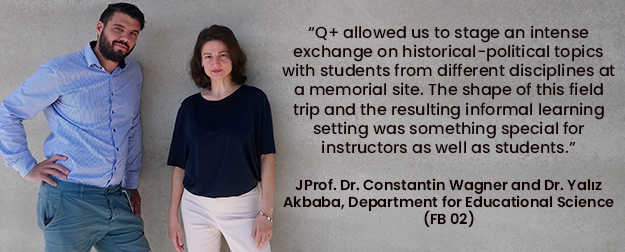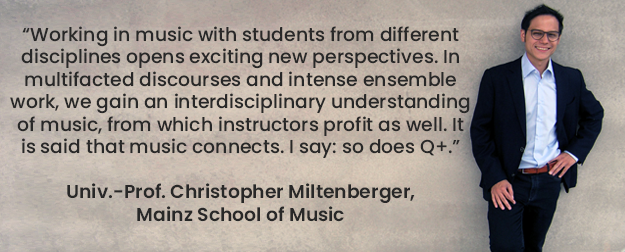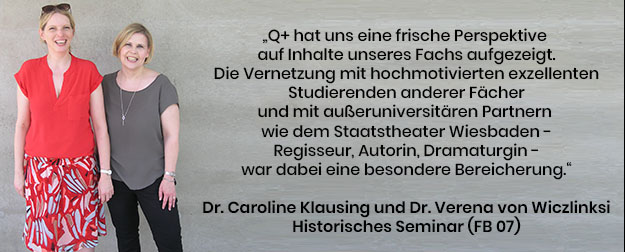We are delighted that you are interested in being part of the Q+ Study Program! Bringing together students and instructors at the JGU with external institutions, the Q+ Program forges connections between the disciplines as well as between society and academia.
With Q+, you will have the opportunity to create courses for and with motivated students from all academic backgrounds. Alternatively, you can also choose to cross-list your regular courses, opening enrollment to students from other programs of study. Whichever approach you choose, the Q+ team will be there to provide all the support you need.
Experience has shown that courses scheduled as blocks are best integrated into Q+ students’ academic schedules. In principle, however, a wide number of course formats are possible. We are happy to advise you regarding suitable formats and scheduling.
Examples of Q+ courses and events are available here.
Participation in courses offered as part of the Q+ Study Program is not graded. Students are given a mark of “pass” or “fail.”
Evaluating student performance can be designed with flexibility in mind. Students are given credit for the workload, and if desired, they can also earn credit points (1 credit point corresponds to a 30-hour workload). A course assignment can include, for instance, a term paper or a short essay, a presentation, an in-person discussion at the end of the term with the instructor, an oral examination, or a report. We are happy to advise you on all matters regarding credit points.
If you are interested in offering a course as part of the Q+ Study Program during the Summer Semester 2021, please fill out this course suggestion form and send it by email to the Q+ team by December, 15 2020. In order to ensure that students from outside your discipline can adequately prepare themselves beforehand and keep up with the course during the semester, please provide a detailed description of the prerequisites needed (e.g. language skills, familiarity with a certain method or canon of literature, knowledge of an instrument, etc.) in this form.
The Steering Committee puts together a varied and interdisciplinary program from among the courses suggested. You will be notified if your course is selected to be part of the Q+ program. Q+ students can then register during the enrollment period.
At the beginning of the semester, you will receive a list of participating students from us, as well as a feedback form. We ask that you complete and return this form to us at the end of the course. This list contains attendance as well as the pass/fail grades for participating Q+ students, along with your suggestions for improvement. Please note that the dean of your faculty must approve your course being included in the Q+ Study Program.
You can count on the Q+ team for support – we are always here to answer any questions you may have.





